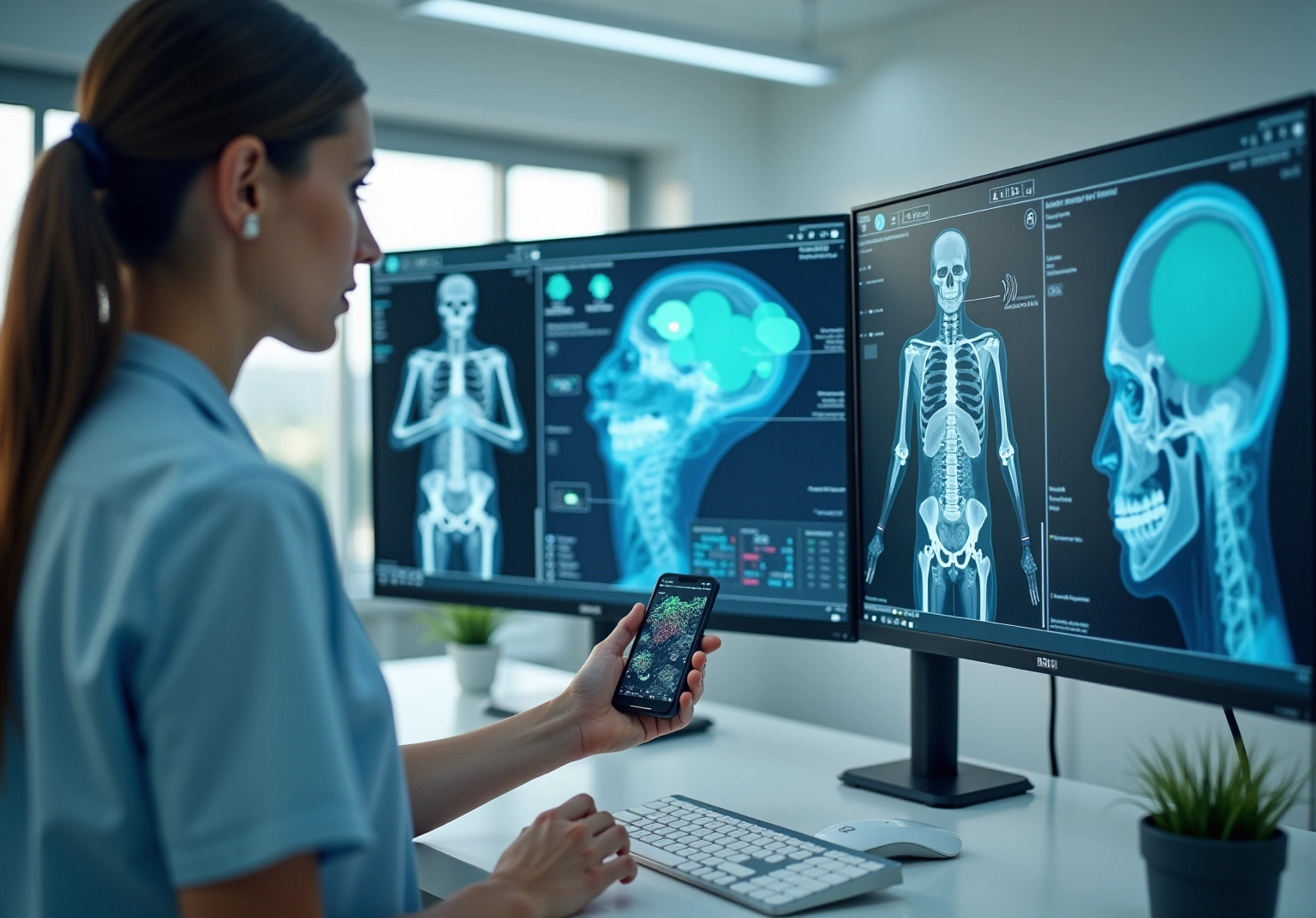
The role of AI in healthcare is crucial for enhancing diagnostic precision, automating administrative tasks, and improving patient outcomes through advanced technologies such as machine learning and natural language processing. This article illustrates AI’s capabilities in:
Collectively, these advancements transform healthcare delivery and decision-making processes, showcasing the significant benefits of integrating AI into the healthcare system.
The integration of artificial intelligence into healthcare is not merely a trend; it signifies a transformative leap in the delivery and management of medical services. By harnessing advanced algorithms and machine learning, AI is revolutionizing diagnostics, enhancing patient care, and streamlining administrative processes. However, as reliance on AI escalates, so does the complexity of its implications—raising critical questions about ethics, bias, and the evolving role of human expertise in medical decision-making.
What does this mean for the healthcare landscape? How can stakeholders navigate the challenges ahead while effectively reaping the benefits of AI?
To understand what is the role of AI in healthcare, it is important to recognize that it represents a significant advancement, involving the implementation of sophisticated algorithms and software designed to analyze complex medical information, automate numerous processes, and enhance decision-making capabilities. By leveraging machine learning, natural language processing (NLP), and advanced analytics, AI empowers medical professionals to diagnose illnesses, predict individual outcomes, and tailor treatment plans. For example, AI-generated operative reports have achieved an impressive accuracy rate of 87.3%, greatly exceeding the 72.8% accuracy of traditional surgeon-written reports. This underscores AI’s potential to enhance diagnostic precision.
The influence of AI extends beyond clinical applications; it also streamlines administrative tasks, fundamentally transforming medical delivery and management. The integration of NLP tools can consolidate health data from diverse sources, effectively addressing the challenges posed by data silos. By dismantling these silos, NLP tools improve the accuracy of Hierarchical Condition Category (HCC) coding, which is vital for optimizing risk adjustment workflows and maximizing Medicare reimbursements. Notably, statistics indicate that 66% of physicians utilized health AI in 2024, a significant rise from 38% in 2023, reflecting a burgeoning trend towards the incorporation of AI into daily practice. Furthermore, 80% of medical institutions affirm that AI is central to their operations, highlighting its essential role in enhancing efficiency and service quality.
To understand the profound impact of AI on medical decision-making, we must explore what is the role of AI in healthcare. By automating routine tasks, AI allows medical providers to focus more on patient interactions, ultimately elevating the quality of care. For instance, Portsmouth Hospitals increased maternity appointment capacity by 33% through intelligent automation, which not only reduced waiting times but also enhanced communication with patients. As medical systems increasingly embrace AI, it raises the question of what is the role of AI in healthcare, particularly through advanced NLP integration for HCC coding, as the potential for improved patient outcomes and operational efficiencies becomes increasingly apparent, marking a pivotal shift in how care is approached and delivered. As Lynn Woolley aptly noted, ‘Automation has been a revelation,’ emphasizing the transformative effect of AI in the medical field.
The evolution of AI in healthcare prompts us to explore what is the role of AI in healthcare, with its roots in the mid-20th century, where initial research focused on expert systems designed to assist clinicians in decision-making. By the 1970s, the applications of AI expanded to include diagnostic tools and predictive analytics, setting the stage for future innovations. The introduction of machine learning in the 1990s marked a pivotal shift, allowing systems to learn from data and enhance their performance over time. In recent years, the dramatic increase in computing power and the explosion of data have propelled the widespread adoption of AI, prompting discussions about what is the role of AI in healthcare through groundbreaking applications such as robotic surgery, telemedicine, and personalized medicine. Today, what is the role of AI in healthcare can be seen as it is intricately integrated into various medical processes, significantly enhancing both clinical outcomes and operational efficiencies.

Understanding what is the role of AI in healthcare reveals that its key applications are transformative and essential for modern medical practices.
AI algorithms significantly enhance the accuracy and speed of medical imaging analysis, such as X-rays and MRIs, which illustrates what is the role of AI in healthcare. This technology empowers radiologists to identify abnormalities with up to 94% accuracy. Such capabilities not only bolster diagnostic precision but also facilitate earlier interventions, ultimately leading to improved outcomes for individuals.
In the context of administrative tasks such as scheduling, billing, and coding, it is important to understand what is the role of AI in healthcare. This automation alleviates the administrative burden on medical personnel, enabling them to dedicate more time to patient care. The integration of tools such as Inferscience’s Care Gaps app exemplifies how AI can simplify the identification, review, and resolution of clinical care gaps, ultimately improving Risk Adjustment Factor scores for Medicare Advantage recipients.

The integration of AI in healthcare, while promising, presents several significant challenges and ethical considerations that demand attention:
The role of artificial intelligence in healthcare is not merely a passing trend; it signifies a fundamental transformation in the delivery and management of medical services. By integrating advanced technologies, AI significantly enhances diagnostic accuracy, personalizes treatment plans, and streamlines administrative processes. Ultimately, this integration aims to improve patient outcomes and operational efficiency throughout the healthcare landscape.
As we delve into AI’s impact, several key insights come to light. The evolution of AI, from its early expert systems to today’s sophisticated applications in predictive analytics and personalized medicine, highlights its potential to revolutionize healthcare practices. Additionally, the challenges and ethical considerations surrounding AI—including data privacy, bias, and the necessity for regulatory compliance—underscore the importance of navigating these complexities with diligence to ensure equitable and effective healthcare delivery.
As the healthcare industry increasingly embraces AI, stakeholders must remain vigilant in addressing the associated challenges while leveraging the technology’s vast potential. The future of healthcare relies on the successful integration of AI, where innovation aligns with ethical responsibility, ultimately paving the way for enhanced patient care and more efficient healthcare systems. Embracing this transformative journey will necessitate collaboration, education, and a steadfast commitment to preserving the human touch in medicine, ensuring that AI serves as a valuable ally in the pursuit of better health for all.